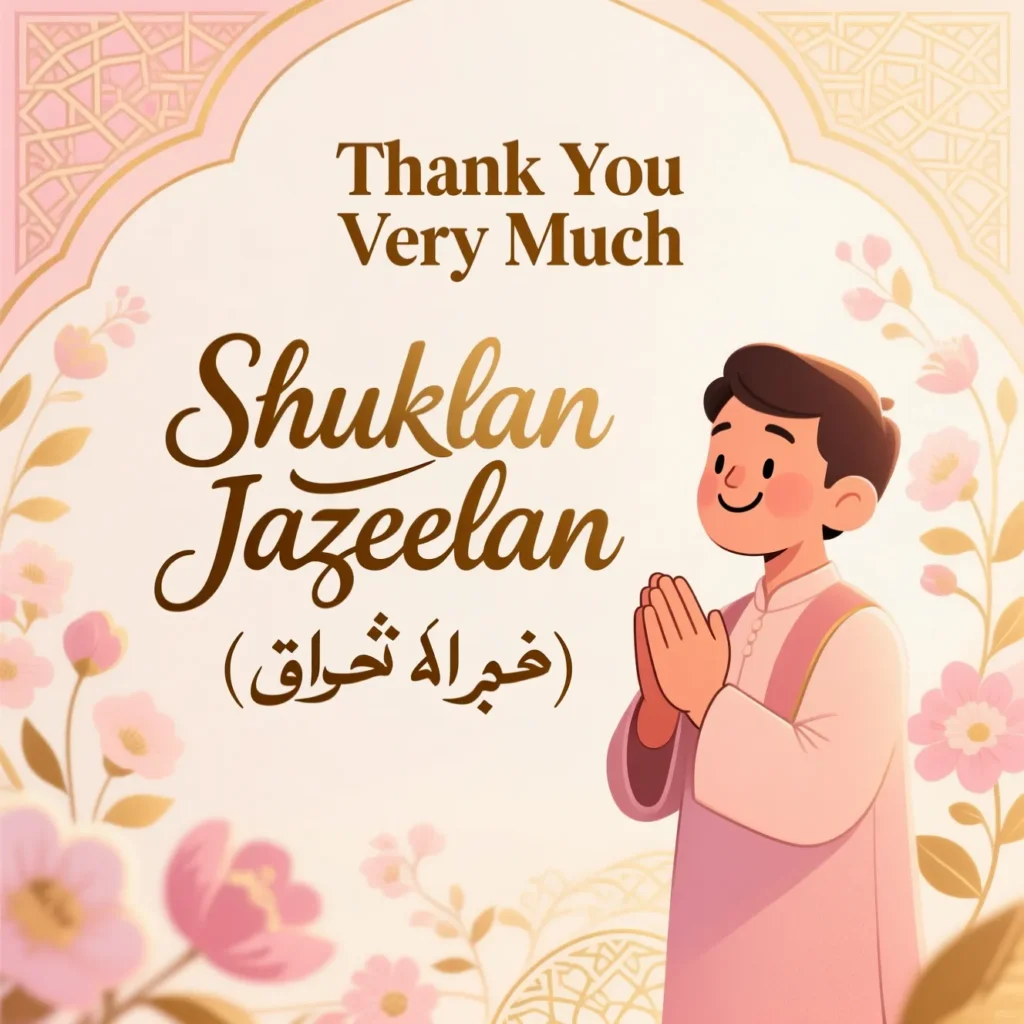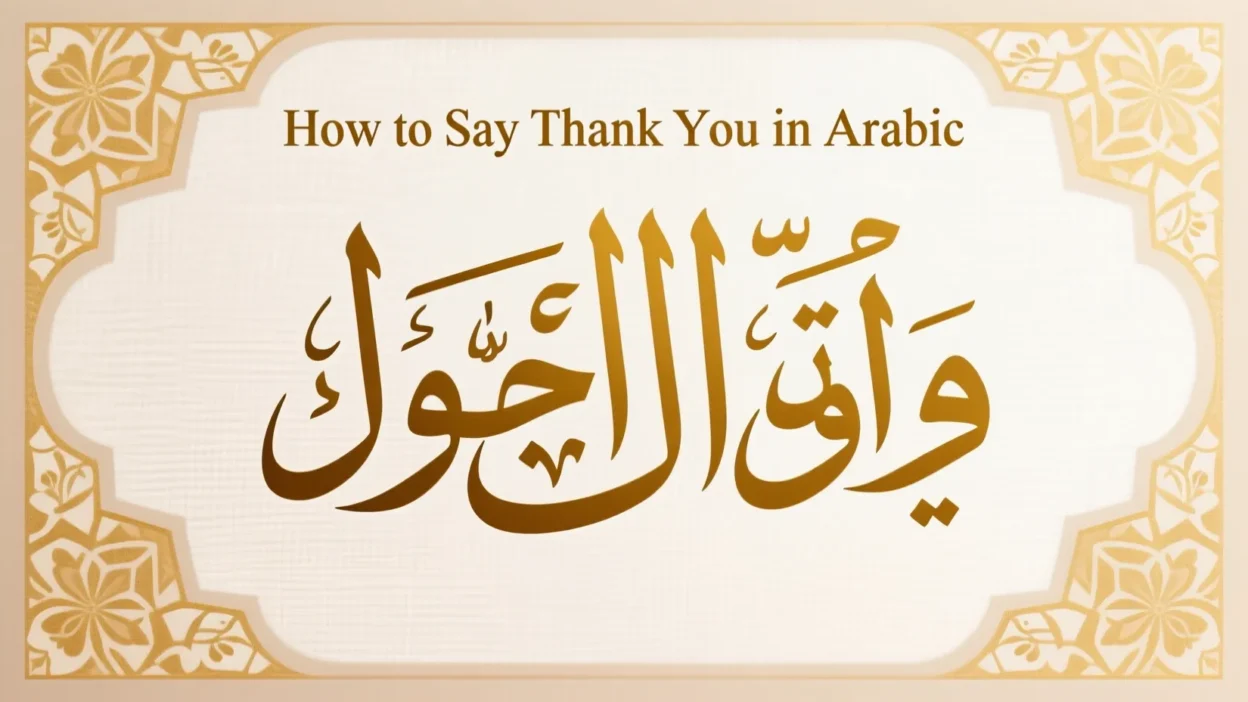Thank you” in Arabic is most commonly said as “Shukran” (شكراً). It is a simple and polite word used across Arabic-speaking countries to express gratitude in everyday conversations, both formal and informal.
Many users search for how to say thank you in Arabic when traveling, learning the language, or communicating with Arabic speakers. The user intent is clear: they want a quick, easy explanation that helps them sound respectful and natural without learning complex grammar.
In this guide, you will learn different ways to say “thank you” in Arabic, including polite and formal responses and common replies you may hear back. These beginner-friendly explanations make it easy to express gratitude correctly in daily life.
Say Thank You in Arabic
Here’s your 15 Ways to Say Thank You in Arabic table with pronunciation, meaning, and context:
15 Ways to Say Thank You in Arabic
| Arabic Phrase | Pronunciation | Meaning | Context |
|---|---|---|---|
| شكراً | Shukran | Thank you | Standard, polite thank you in all Arabic-speaking countries |
| شكراً جزيلاً | Shukran jazīlan | Thank you very much | More formal and emphatic |
| ألف شكر | Alf shukr | A thousand thanks | Warm, casual yet sincere |
| جزاك الله خيراً | Jazāk Allāhu khayran | May God reward you with goodness | Religious, often used among Muslims |
| بارك الله فيك | Bārak Allāhu fīk | God bless you | Religious, formal or personal |
| ممنون | Mamnoon | Grateful / Thankful | Common in Levant and Gulf dialects |
| مشكور | Mashkūr | Appreciated / Thank you | Gulf countries, friendly tone |
| كل الشكر | Kul al-shukr | All thanks | Casual but sincere |
| تسلم | Tislam | Bless you (lit. may you be safe) | Informal, friendly |
| تسلمي | Tislami | Bless you (to a female) | Informal, friendly |
| يعطيك العافية | Yaʿṭīk al-ʿāfiyah | May God grant you health | Common in Levant & Gulf |
| متشكر | Mutashakkir | Thankful / Thank you | Used in Egypt |
| متشكرة | Mutashakkirah | Thankful (female speaker) | Used in Egypt |
| ممنون جداً | Mamnoon jiddan | Very grateful | Polite and formal |
| مشكور وايد | Mashkūr wāyid | Thanks a lot | Gulf slang, friendly |
1. Shukran (شكرًا) – Thank you
Origin:
From the root “sh-k-r” (ش-ك-ر), which relates to gratitude. This is the most common and widely used form of thanks in Arabic-speaking countries.
Example:
👤 User A: Here’s your coffee.
👤 User B: شكرًا! (Shukran!) That was kind of you.
Use: Universal, suitable in almost all situations.
2. Shukran Jazeelan (شكرًا جزيلًا) – Thank you very much

Origin:
“Jazeelan” intensifies the meaning, like saying “a lot” or “greatly.” It’s used when you want to show deeper appreciation.
Example:
👤 User A: I brought your documents from the office.
👤 User B: شكرًا جزيلًا! (Shukran jazeelan!) You saved me a trip.
Use: More formal or heartfelt than a simple “shukran.”
3. Alf Shukr (ألف شكر) – A thousand thanks
Origin:
“Alf” means “thousand.” This phrase emphasizes how much you appreciate the person’s help—like saying “Thanks a million!”
Example:
👤 User A: I canceled your appointment for you.
👤 User B: ألف شكر! (Alf shukr!) That’s a huge help.
Use: Emotional or exaggerated thankfulness.
4. Mamnoun(a) (ممنون / ممنونة) – I’m grateful (male/female)

Origin:
Used in Levantine Arabic (e.g., Lebanon, Syria), derived from Persian influence. “Mamnoun” is masculine; “Mamnouna” is feminine.
Example:
👤 User A: I bought you a ticket.
👤 User B: ممنونة إلك! (Mamnouna ilak!) You’re the best.
Use: Regional; very common in the Levant, polite and warm.
5. Tislam (تسلم) / Tislami (تسلمي) – May you be safe
Origin:
From the root word for peace and safety. It’s a heartfelt way to say “thank you,” especially in the Gulf and Levant.
Example:
👤 User A: Here’s your meal.
👤 User B: تسلم! (Tislam!) Much appreciated.
Use: Cultural; common in spoken Arabic, very warm.
6. Allah Yekhallik (الله يخليك) – May God keep you

Origin:
A beautiful religious phrase meaning “May God preserve you,” used as a sincere thank-you.
Example:
👤 User A: I got your medicine.
👤 User B: الله يخليك! (Allah yekhallik!) You’re a lifesaver.
Use: Common across Arab cultures; adds spiritual warmth.
165+ Formal & Informal Ways to Say Hello in Greek ✨2026 Best
7. Barak Allah Feek (بارك الله فيك) – God bless you
Origin:
Religious phrase used to show deep gratitude and blessing, often heard in Islamic contexts.
Example:
👤 User A: I gave your son a ride home.
👤 User B: بارك الله فيك. (Barak Allah feek.) Thank you so much.
Use: Spiritual and formal; used in respectful or religious settings.
8. Mashkoor (مشكور) / Mashkoora (مشكورة) – You are thanked
Origin:
Past passive participle of “thank” in Arabic. It’s like saying “Thanks to you.”
Example:
👤 User A: I helped with your project.
👤 User B: مشكور والله. (Mashkoor wallah.) Appreciate it, truly.
Use: Gulf dialects, polite and semi-formal.
9. Ana Aakir Ilak (أنا شاكر إلك) – I’m thankful to you
Origin:
“Shaakir” or “Aakir” literally means “one who thanks.” This is formal and deeply respectful.
Example:
👤 User A: I submitted your paperwork.
👤 User B: أنا شاكر إلك. You went out of your way!
Use: Formal and personal; shows strong gratitude.
10. Jazaka Allahu Khayran (جزاك الله خيرًا) – May Allah reward you with goodness
Origin:
Religious and often used among Muslims. Saying this is considered more rewarding than just “shukran.”
Example:
👤 User A: I paid your fees at the clinic.
👤 User B: جزاك الله خيرًا! (Jazaka Allahu khayran!) I pray for your kindness.
Use: Religious and powerful; often used instead of “thank you.”
11. Ya’tik Al-‘Afyeh (يعطيك العافية) – May God give you strength
Origin:
Common in the Levant and Gulf; used to thank someone for effort or hard work.
Example:
👤 User A: I stayed late to finish the report.
👤 User B: يعطيك العافية! That’s true dedication.
Use: Polite, used when someone has done a task or favor.
12. Min Kul Albi (من كل قلبي) – From all my heart
Origin:
Romantic or deeply emotional version, meaning your thanks is heartfelt.
Example:
👤 User A: I stood by you during your tough time.
👤 User B: من كل قلبي، شكراً. I mean it with all my heart.
Use: Intimate or deeply personal thank-you.
13. Ana Mitshakker (أنا متشكر / متشكرة) – I’m thankful
Origin:
Used often in Egypt. “Mutashakker” (m) or “Mutashakkira” (f) reflects formal gratitude.
Example:
👤 User A: I brought you some lunch.
👤 User B: أنا متشكر أوي! You’re a gem!
Use: Egyptian dialect; formal but still friendly.
14. Kull Al-Shukr (كل الشكر) – All the thanks
Origin:
Used to emphasize complete gratitude, like saying “All my thanks to you.”
Example:
👤 User A: I helped handle the situation.
👤 User B: كل الشكر لك. I truly appreciate it.
Use: Formal, often written or spoken in official settings.
15. Mish ‘Arif Ashkurak Izzay (مش عارف أشكرك إزاي) – I don’t know how to thank you
Origin:
An expressive Egyptian phrase showing overwhelming gratitude.
Example:
👤 User A: I paid your school fees.
👤 User B: مش عارف أشكرك إزاي! You saved my future.
Use: Emotional and informal, used when someone is deeply touched.
FAQs
1. How do you say “Thank you” in Arabic?
The most common way is شكراً (shukran).
2. How do you pronounce شكراً (shukran)?
Say it like: shoo-kran
3. Is شكراً (shukran) formal or informal?
It works for both — formal and casual situations.
4. How do you say “Thank you very much” in Arabic?
Say: شكراً جزيلاً (shukran jazeelan).
5. How do you respond when someone says شكراً (shukran)?
You say: عفواً (afwan) meaning you’re welcome.
6. What is a polite and warm way to say thank you?
You can say: أشكرك من قلبي (ashkuruka min qalbi) meaning thank you from my heart.
7. How do I thank someone older or respected?
شكراً جزيلاً (shukran jazeelan) sounds more polite and respectful.
8. How do you say “Thanks bro” casually?
Say: شكراً يا أخي (shukran ya akhi) meaning thanks, brother.
9. Is the phrase the same for people of all genders?
Yes ✅ شكراً (shukran) stays the same for everyone.
10. How do I say “Thank you for everything” in Arabic?
Say: شكراً على كل شيء (shukran ala kull shay’).
Conclusion:
Mastering how to say thank you in Arabic goes beyond language—it’s about showing respect, kindness, and cultural appreciation.
Whether you choose the casual “Shukran” or a more formal phrase, each expression of gratitude will help you connect with people on a deeper level. The more you practice these phrases, the more natural and heartfelt your conversations will feel.



